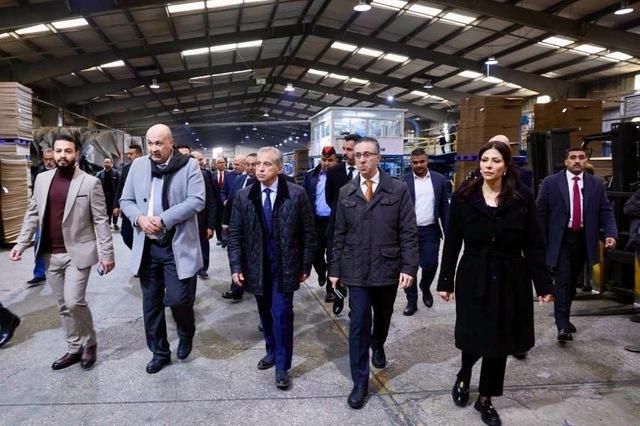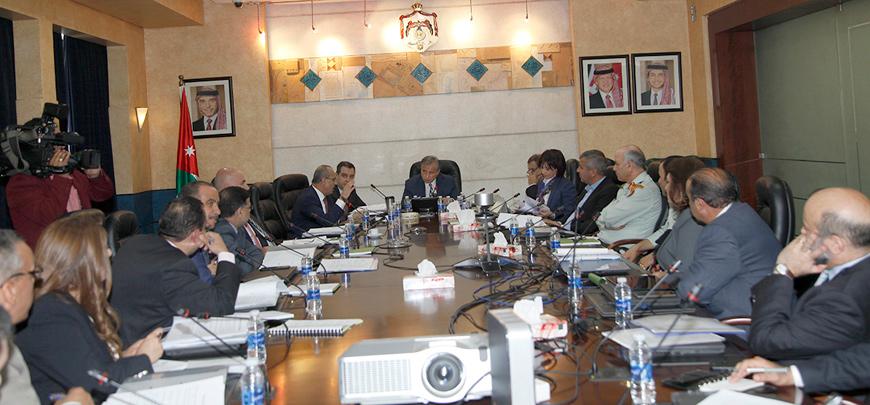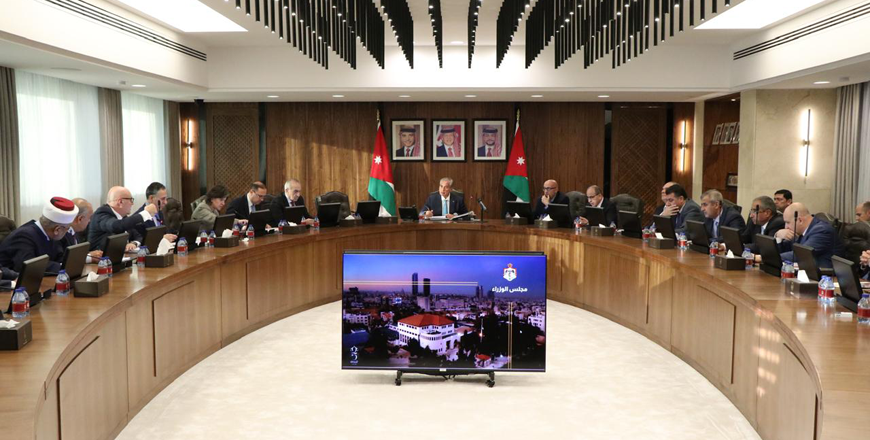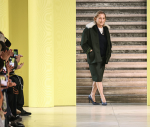You are here
Cabinet holds session in Mafraq, approves infrastructure, services, development projects
By JT - Feb 11,2025 - Last updated at Feb 11,2025
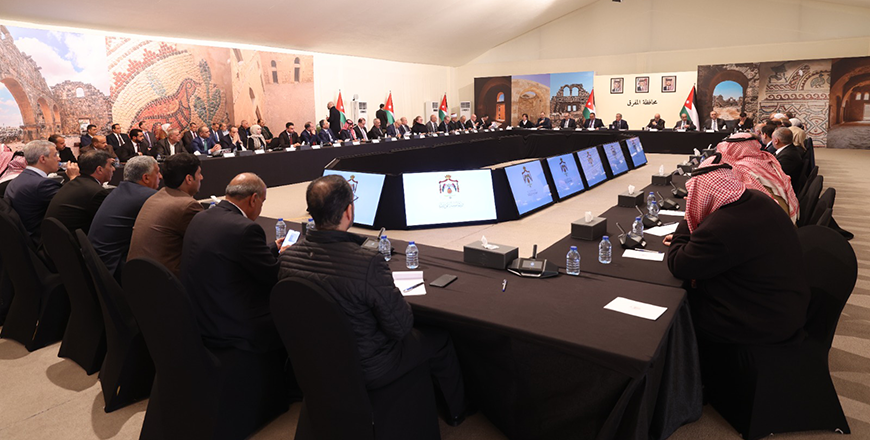
During a cabinet meeting held in Mafraq, Prime Minister Jafar Hassan stresses that the meeting aimed at aligning the governorate's development vision with national priorities (Petra photo)
AMMAN — Prime Minister Jafar Hassan visited key sites in Mafraq on Tuesday ahead of a Cabinet meeting in the governorate.
The tour included stops at the King Hussein Bin Talal Development Area, the newly inaugurated Greater Mafraq Municipality building, and the opening of a conference and activity hall at Al Bayt University’s Centre for Sustainable Development and Women Empowerment.
At the King Hussein bin Talal Development Area, Hassan toured successful factories that have become models of industrial growth, creating hundreds of job opportunities for Jordanians, according to a Prime Ministry statement.
He also reiterated the government's commitment to supporting these investments and announced plans to further expand them and attract more investment to the area.
As part of efforts to enhance industrial development, the prime minister directed the provision of 10 megawatts of solar energy to power the factories within the development zone to encourage expansion, attract additional investment and generate more employment opportunities.
Hassan also visited the Jordanian-Bahraini Paper Industries Company, established in 2007 with an investment of JD19 million on an 18-hectare site, which employs around 150 people and produces nearly 2,000 tonnes of paper monthly.
The premier also visited the Italian Star Company for Aluminum Extrusion and Coating, which was founded in 2018 with an investment of JD 5.8 million on a 12.5-dunum site.
The company, providing over 50 job opportunities, produces between 200 and 250 tonnes of aluminium per month. Hassan was briefed on the company’s modern manufacturing techniques and its contribution to local industry.
The prime minister also inaugurated the newly renovated Greater Mafraq Municipality building, which has been modernised to house a comprehensive government services centre.
Located on land donated by the municipality, the three-storey facility will include parking for 800 vehicles to ease congestion in the business district, as well as a public park for residents. It will be powered by a 300-kilowatt solar energy system.
At Al Bayt University, Hassan, along with the minister of education and higher education, inaugurated the conference and activity hall at the Centre for Sustainable Development and Women Empowerment. The centre, aimed at training women from both the university and local communities, focuses on promoting women's entrepreneurship in the green economy and sustainability sectors.
The new building spans over 4,000 square metres and houses an Innovation and Entrepreneurship Excellence Centre, multiple training rooms, a modern conference hall, advanced technology labs, and a 900-square-metre internal garden.
The centre will also be accredited by the Ministry of Labour as one of nine specialised training hubs for women with small businesses.
Minister of Government Communication and Government Spokesperson Mohammad Momani announced the decisions made by the Cabinet during its session.
The government approved JD500,000 for the construction of a public park on 200 dunams of land at Al al-Bayt University and authorised amendments to groundwater monitoring regulations to address unlicensed wells used for agriculture in Mafraq and across the country.
The Cabinet also granted mining rights for volcanic tuff and gypsum in Al Mafraq and Zarqa.
In healthcare, the government decided to begin maintenance work on Northern Badia Hospital and issue a tender for a new emergency department at Mafraq Governmental Hospital
To support economic development, a gas supply project for the King Hussein Bin Talal Development Area, set to be completed by 2027, aims to reduce production costs, enhance competitiveness, and attract more investment.
The Cabinet also approved the provision of 10 megawatts of solar energy to power factories in the development zone.
On political and public sector reforms, the government amended the Human Resources Management and Civil Service Bylaw to encourage public sector employees to participate in political life and run for elections, granting annual salary increases to those who resign to run for municipal and governorate council elections.
The classification of the Director-General of the prime minister's office was downgraded from ministerial rank to secretary-general rank.
In line with the Economic Modernisation Vision, the Cabinet also approved unifying fees for Jordanian and Syrian trucks to facilitate trade between the two countries, following agreements to streamline goods movement and freight transportation through the Jaber border crossing.
Previously, Syrian authorities had abolished all fees and stamps imposed at the Jaber-Nasib crossing.
Both countries had earlier engaged in discussions to increase trade volume, address challenges faced by the private sector and reduce transit truck fees.
The cabinet also approved the national rangeland strategy for 2025–2030 and granted licensed public transport operators a 25 per cent exemption on outstanding dues if paid by the end of the year to support the sector, which has been impacted by economic challenges like the COVID-19 pandemic and rising fuel prices.
The Council of Ministers also endorsed the settlement of 772 tax cases for companies and taxpayers based on recommendations from the tax settlement committee.
Momani stressed that holding monthly Cabinet sessions in different governorates reinforces fieldwork as a core government approach and allows developmental plans to be presented directly to elected bodies.
The cabinet also announced that a comprehensive government services centre will be established on land donated by the municipality.
Related Articles
AMMAN — Prime Minister Jafar Hassan on Tuesday highlighted the strategic importance of the eastern city of Mafraq, citing its diverse econom
AMMAN —The Public-Private Partnership Council on Sunday approved a number of capital and development projects that will be referred to the C

Opinion
Apr 09, 2025
Apr 08, 2025
- Popular
- Rated
- Commented
Apr 08, 2025
Apr 09, 2025
Newsletter
Get top stories and blog posts emailed to you each day.


